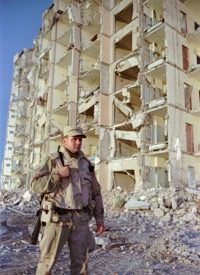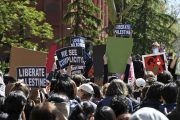
The Times recalled that al-Amiri was a commander in the Revolutionary Guard’s Badr Corps, the leading edge of that nation’s military effort against Iraq and the regime of Saddam Hussein, and remained in that theatre throughout the late 1980s and ’90s. “The FBI linked the Revolutionary Guard to the attack on the Khobar Towers in Khobar, Saudi Arabia, on June 25, 1996,” reported the Times. “Nineteen U.S. servicemen were killed by a bomb blast at the towers, which were housing American military personnel.”
Louis Freeh, who served as FBI director during that time, expressed his shock that an individual with known ties to the deadly attack on U.S. personnel would be part of the White House meeting. “As a senior leader, [al-Amiri] would have to have known about Khobar, and he would know Gen. [Ahmad] Sherifi, who was the IRGC general that conducted the operation,” Freeh was quoted by the Times as saying. Freeh added that the “FBI would love to sit down and talk to him, show him photographs, and ask him questions” about other suspects in the attack.
The Times noted that the IRGC has also been linked to other terrorist acts, “including an attack on the Jewish cultural center in Buenos Aires in 1994, in which 85 people were killed and hundreds wounded.”
In a letter to President Obama, U.S. Representative Ileana Ros-Lehtinen (R-Fla.), Chairwoman of the House Foreign Affairs Committee, expressed “grave concern” about the President’s decision to include al-Amiri in the White House meeting. “Al-Amiri should have no part in a successful future in Iraq, and is unfit to receive a presidential audience,” Ros-Lehtinen exhorted the President.
She said that it was “extremely disturbing that the White House would see fit to welcome Al-Amiri to a discussion on the future of Iraq. If anything, he should be subject to questioning by the FBI and other appropriate U.S. law enforcement and counterterrorism agencies.” She added that the “victims of Khobar Towers and the families of thousands of U.S. troops who paid the ultimate sacrifice in Iraq deserve no less.”
Those victims were equally vocal in their displeasure over al-Amiri’s White House visit. William Schooley, one of the survivors of the attack, said that outrage didn’t begin to describe his feelings. “I watched outstanding airmen die that night and witnessed horrific carnage,” said Schooley, who was an Air Force sergeant at the time, and was in his room behind the building that was destroyed by the attack. “The survivors of Khobar Towers have been swept under the rug and now have received the greatest insult.”
Schooley told the Times that immediately after the blast he went to help in the rescue of survivors. “I cleared the path for the walking wounded to evacuate and then provided first aid to the wounded,” he recalled. “Unfortunately, the airman I was working on did not survive. I don’t know how to put arms back on.”
Another survivor of the attack, speaking anonymously, told the Times that the actions by the White House were akin to betrayal. “Given Hadi al-Amiri’s ties to terrorism and potential knowledge of those who committed the yet-unsolved FBI investigation into the brazen murder of 19 USAF airmen at Khobar Towers, his presence in the White House was nothing short of insulting to those who both lost family members and those who survived the horrific attack,” he said. “It wouldn’t matter whether it was a Democrat or a Republican in the White House — it was just wrong.”
The Obama administration justified al-Amiri’s inclusion in the Iran-White House confab by recalling that the Bush administration had feted Iraqis who were working with the Iranian government against the Saddam Hussein regime. Asked by Fox News about al-Amiri’s presence at the White House, an Obama administration official forwarded a photo showing a 2006 White House meeting between President Bush and Sayyed Abdul Aziz al-Hakim, the then-head of the Islamic Supreme Council of Iraq.
The Islamic Supreme Council of Iraq, formed in Iran in 1982 with the goal of overthrowing Iraq’s Saddam regime, was one of the main groups receiving military and financial support from Iran throughout the 1980s and ’90s, and Middle East experts note that there existed a seamless relationship between that group and the Badr Crops.
Terrorism expert Erick Stakelbeck told CBN News that, like President Obama, the Bush administration was not above allowing “the Muslim Brotherhood into the halls of power in the U.S. government.” He added, “Now we have a member of the Iran’s Revolutionary Guard Corps [with] American blood on their hands. When will we wake up?”
Correction: In the first paragraph, the author originally identified Hadi Farhan al-Amiri as an official in the government of Iran. That error has been corrected to identify him as the transportation minister in the Iraqi government.
Photo of Khobar Towers: AP Images



